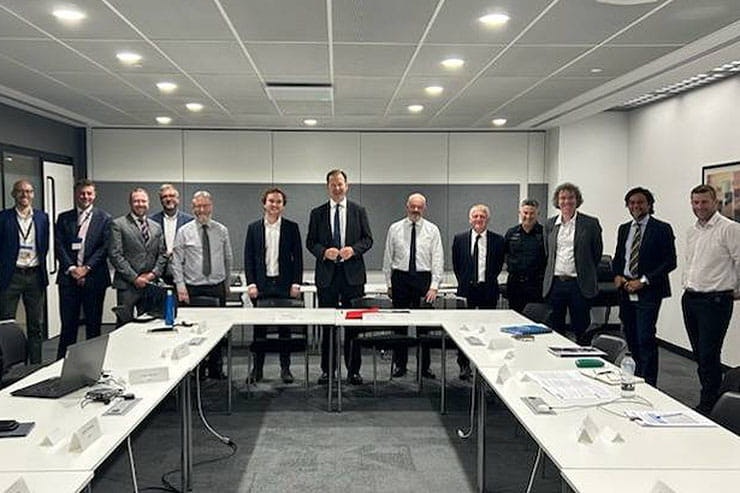Motorcycle Industry Meets Government Over Zero Emissions Plans
By Ben Purvis
Motorcycle Journalist
22.06.2023
Representatives from across the UK motorcycle industry have met with transport minster Jesse Norman to call for a measured and sensible decarbonisation policy for bikes as the Government’s proposed cut-off date of 2035 for carbon-emitting motorcycles draws ever nearer.
Nearly a year on from the start of a consultation into Government ideas to phase out fossil-fuelled motorcycles by 2035, with sub-125cc classes facing an even nearer end-date of 2030, the responses to that consultation have yet to be published and definitive plans for the phase-out of petrol-powered bikes have yet to be seen. Now the motorcycle industry, including representatives from the Motorcycle Industry Association (MCIA), motorcycle manufacturers and rider groups including the National Motorcyclists Council (NMC) have met with the minister to call for a ‘proportional and technology-neutral approach’ to the planned phase-out.
Unlike cars, which are undergoing a rapid shift towards hybrid and fully-electric power, motorcycles aren’t well-suited to battery-electric technologies. Cars can easily be made larger and heavier to accommodate bulky batteries, offsetting the weight by using bigger, heavier motors to maintain performance. Motorcycles, and particularly larger, longer-range and higher-performance bikes, can’t take the same approach; they’re already more tightly-packaged than cars and it’s impossible to simply make them bigger without facing a catastrophic impact on handling, braking and manoeuvrability.
The motorcycle industry representatives at the meeting were keen to emphasise this, among other concerns.
They pointed out that motorcycles make a negligible impact on transport emissions (0.4% of the total) and offer significant benefits to urban travel and traffic volumes but are also calling for a ‘technology-neutral’ approach to decarbonisation, leaving the door open to carbon-neutral combustion engines running on synthetic e-fuel rather than a mandatory switch to electric power.
This reflects similar shifts in the narrative around cars in the EU, where a mooted blanket ban on new cars with combustion engines from 2035 has been softened, opening the door to e-fuel combustion-engine models provided the fuel is 100% carbon-neutral. E-fuels are made by combining hydrogen, electrolysed from water, and carbon dioxide scavenged from the air. As long as those processes are achieved using renewable power, the result is zero net contribution to CO2 levels. MotoGP and F1 racing are both already planning to switch to e-fuels in the coming years, helping to accelerate their development.
E-fuels are also already being developed for aircraft. Like motorcycles, aeroplanes can’t make a wholesale switch to electric power because the size and weight of the batteries would make them too big and heavy. The MCIA has called for a ‘bespoke’ approach to decarbonisation for motorcycles, as is being taken for the aviation industry and heavy goods vehicles, which also face huge challenges in moving to battery power.
The industry also pointed out the ‘significant price point hurdle’ introduced by a move to large-capacity electric motorcycles, requiring a ground-up redevelopment of the supply chain and manufacturing and a knock-on price increase that would push them out of reach for most customers.
They also hammered home the point that the UK is currently alone in its proposed 2035 phase-out date for new ICE motorcycles. Being out-of-step with international regulation changes puts the UK market at a significant disadvantage in that respect, as motorcycle companies are unlikely to pour R&D resources into bikes suited only to the UK.
MCIA CEO Tony Campbell said: "We were grateful for the recognition our sector received for its important role in shaping the future of transportation. The Minister showed genuine interest in our concerns and actively participated in the discussion. We look forward to continuing our collaboration with officials to ensure the right decisions are made on phase out and that the Government fully harnesses the potential of our vehicles for the benefit of everyone.”
The National Motorcycle Council’s position was largely similar, but added a consumer focus by calling for reassurances that ICE motorcycles already in use won’t be banned, pointing out that mass scrappage, shortening the lifecycles of existing bikes, has a substantial environmental impact that would be likely to outweigh any benefits.
NMC Executive Director Craig Carey-Clinch said: “This landmark event illustrated the impact that the motorcycle lobby as a whole can make when it acts together. This landmark session was a genuine first in terms of the strength of argument put forward by riders and industry in what is the key issue of our times. The Minister was in listening mode and seems willing to discuss further the points that were made in the meeting. But with no date yet announced for the Government’s policy announcement on motorcycle decarbonisation, there is still much to do to make sure that our messages are fully taken on board. As a result, the willingness of Mr Norman to keep dialogue open on areas such as e-fuels is very welcome.”
If you’d like to chat about this article or anything else biking related, join us and thousands of other riders at the Bennetts BikeSocial Facebook page.
Share on social media:
